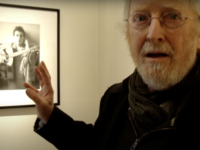Photo by Tom Marcello
A new reissue series focusing on turn-of-the-1980s sides by the underappreciated Woody Shaw doesn’t consistently illustrate why he’s sometimes considered the last of the true innovators at the trumpet. But United certainly does.
Shaw, playing in his last date as a leader for Columbia Records, marked his return to the purely straight-ahead style with a group that managed to keep up with his restless focus on innovation.
If only just barely sometimes.
United, long out of print, is part of a new series of Shaw reissues by Wounded Bird that also includes 1979’s Woody III and 1980’s For Sure! Among the featured sidemen on this 1981 date are trombonist Steve Turre, pianist Mulgrew Miller and drummer Tony Reedus. They give Shaw a chance to step up and just blow. And blow, my friends, he most certainly does.
So why isn’t Woody Shaw more famous?
A noted sideman through the 1960s with Joe Henderson, vibraphonist Bobby Hutcherson, Art Blakey’s Jazz Messengers and drummer Louis Hayes, among others, Shaw perhaps came of age a decade or so too late. He wouldn’t become well-known as a leader until the 1970s, as popular tastes moved away jazz.
Part of it, too, was that he died too young after being struck by a subway car in 1989 at age 44. That’s left a deeply individualistic, harmonically challenging legacy – one that combined elements of post-bop, modal, fusion and free jazz – to the backroom bins at local record stores.
If you haven’t already made that trek, a nice place to start with Shaw is here, on a record that I consider one of his very best.
Shaw opens with the Wayne Shorter-composed title track, running neck and neck with Turre. Reedus and Stafford James immediately set a bracing tone, while Miller adds splashes of tones and colors. Shaw’s solo starts as a simple exploration outside of the main theme, but then he begins climbing up, further and further into the toppermost of his range, all while playing with a furious propulsion. When Miller takes over, though he does a fine job, the exhalation in the music is palpable. “United” ends with a thundering switch to the toms by Reedus, and a circular, winking restatement.
Shaw’s original “Greene Street Caper” is a cosmopolitan swinger, and James pleasantly tangles with the now-muted trumpeter. They trade licks for a time, conversationally then almost like boxing partners, before Shaw steps up to fully occupy the song’s spotlight. Miller, this time, perfectly encapsulates the tune’s urbane groove. Turre and James then provide a chugging bed of greasy R&B for Shaw to skitter over as the caper ends.
In a brilliantly noisy moment, Shaw threatens to implode Cole Porter’s “What Is Thing Called Love,” with the aid of altoist Gary Bartz. This angular preamble is as inventive as it is surprising. Alas, they finally settle into an up-tempo reading of the conventional melody, but all is not lost as Shaw leaps right back into a series of searing, sputtering then splintering runs. Bartz is game, too, moving with a contagious abandon through the tumbling rhythm signature. But it’s Turre, dealing with an instrument that boasts more emotive elasticity than sheer speed, who impresses the most. His solo is a wonder of precision and power. Miller compliments it all with an impish virtuosity, opening the door for a brief, banging aside by Reedus. The entire group then rejoins for a final, all-too-brief go at that shambling disassembly of Porter’s classic theme, only to ride off into the sunset.
Miller’s original “Pressing the Issue” follows, giving Shaw and Turre another opportunity to spar. The pianist, perhaps unsurprisingly, goes on to construct one of his most committed solos, this time over a bounding beat from James and Reedus.
“Katrina Ballerina” is the penultimate tune on United, recorded at New York City’s Right Track Studios over three days in March 1981, and it may be the best iteration of this familiar Shaw composition. He and Turre open with a crisp, swooning duet, recalling the introspective soul-jazz triumphs of Oliver Nelson or Curtis Fuller’s Blues-ette, and Shaw stays on that tack throughout. His solo, largely free of pyrotechnics, has a melancholy majesty.
Finally, there’s “Blues for Wood,” co-written by Shaw, which goes to the bottom of a brown bottle for its inspiration. Miller provides a sizzling, almost salacious opening before Shaw comes bip-bopping out. After a series of short, sharp shocks, the group begins to shimmy and shake behind Shaw, giving the song a neon lit-saloon feel. James and Turre offer their thoughts next, in a pair of competent solos, before Shaw comes charging back in – goosing everyone back into a new vitality.
Of course, Shaw would later be diagnosed with an incurable degenerative eye disease, something that perhaps played a role in his tragic end. He suffered complications from the resulting surgery, and died of kidney failure. But not before leaving behind this somehow-forgotten, adventurous little gem called United. Aside from a trio of notable collaborations with Freddie Hubbard, this may be the last best thing Woody Shaw ever did.
[amazon_enhanced asin=”B004C9P9NS” price=”All” background_color=”FFFFFF” link_color=”000000″ text_color=”0000FF” /] [amazon_enhanced asin=”B000005H07″ price=”All” background_color=”FFFFFF” link_color=”000000″ text_color=”0000FF” /] [amazon_enhanced asin=”B00138KLIO” price=”All” background_color=”FFFFFF” link_color=”000000″ text_color=”0000FF” /] [amazon_enhanced asin=”B004C9P9XS” price=”All” background_color=”FFFFFF” link_color=”000000″ text_color=”0000FF” /] [amazon_enhanced asin=”B004C9PA0K” price=”All” background_color=”FFFFFF” link_color=”000000″ text_color=”0000FF” /]
- Nick DeRiso’s Best of 2015 (Rock + Pop): Death Cab for Cutie, Joe Jackson, Toto + Others - January 18, 2016
- Nick DeRiso’s Best of 2015 (Blues, Jazz + R&B): Boz Scaggs, Gavin Harrison, Alabama Shakes - January 10, 2016
- Nick DeRiso’s Best of 2015 (Reissues + Live): John Oates, Led Zeppelin, Yes, Faces + others - January 7, 2016


